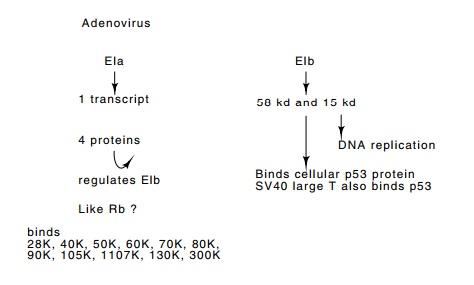Chapter: Genetics and Molecular Biology: Oncogenesis, Molecular Aspects
DNA Tumor Viruses
DNA Tumor Viruses
DNA viruses are less closely associated with cancer
than are the retroviruses because their infection does not usually yield
tumors. Except for papillomaviruses, which cause warts, DNA viruses cannot
readily be found in natural tumors. Papovaviruses, including SV4O, and the very
closely related polyoma virus, as well as adenoviruses and herpes viruses, do
have the capability of transforming cells in culture so that they lose their
density-dependent growth regulation. These trans-formed cells can then be
injected into animals, where they will cause tumors.
Transformation of mouse cells by SV4O and of
hamster cells by polyoma virus involves T proteins that are called T antigens.
Normally three are found. They are called small, middle, and large T, for their
respective sizes. The messenger for these three different proteins origi-nates
from one gene as a result of alternative splicing of the mRNA. The three
proteins were identified immunologically in the same way the retroviral
oncogene proteins were identified. Antibodies against these proteins are
induced in response to the presence of the virus.
The antibodies obtained from animals carrying SV4O-
and polyoma-induced tumors have been used to show that the T antigen genes are
expressed early after infection and that the T antigens bind to proteins in the
nucleus, to DNA, and to other cellular structures. The presence of one of the T
antigens alone is usually insufficient to transform cells, suggesting that in
general the process of transformation requires a number of steps. This
conclusion is in accord with the fact that the NIH
The activity of the T antigens has been a subject
of great interest, but the low levels at which they are synthesized in vivo has greatly hampered their
study. They were therefore perfect targets for genetic engineering. Indeed, by
properly fusing the DNA encoding the different proteins to suitable
ribosome-binding sequences, these proteins have been hy-persynthesized in
bacteria, and the proteins can be used for biochemical studies. They also serve
as a marker for expression of a promoter in an organism. A promoter and its
associated regulatory sequences can be fused to the T antigen gene and inserted
into the chromosome of an animal. Expression of the T antigen gene frequently
gives rise to tumors that are confined to the tissues in which the gene is
expressed.

Figure 23.10 Products of adenovirus E1a and E1b bind multiple cellularproteins.
Adenoviruses and papillomaviruses also possess
genes responsible for transformation of cells. Like the SV40 virus, their
oncogenes possess no cellular counterparts. Two transcripts are synthesized
from the E1a and E1b genes of adenovirus (Fig. 23.10). Through splicing and
protein processing, each gives rise to four or five protein products. Some
regulate other genes, and two bind to cellular proteins important in
transformation. The adenovirus E1a binds to a protein discussed below called Rb
for retinoblastoma. The adenovirus E1b protein binds to a cellular protein of
53,000 molecular weight called p53. One of the SV40 T antigens also binds to
this same protein, as does a protein encoded by papillomaviruses.
Papillomaviruses also encode a protein which binds to Rb. The fact that
different tumor viruses synthesize proteins that inactivate Rb and p53
indicates that these two cellular proteins are important for normal cell
growth. Indeed, the next section describes experiments leading to the same
conclusion.
Related Topics